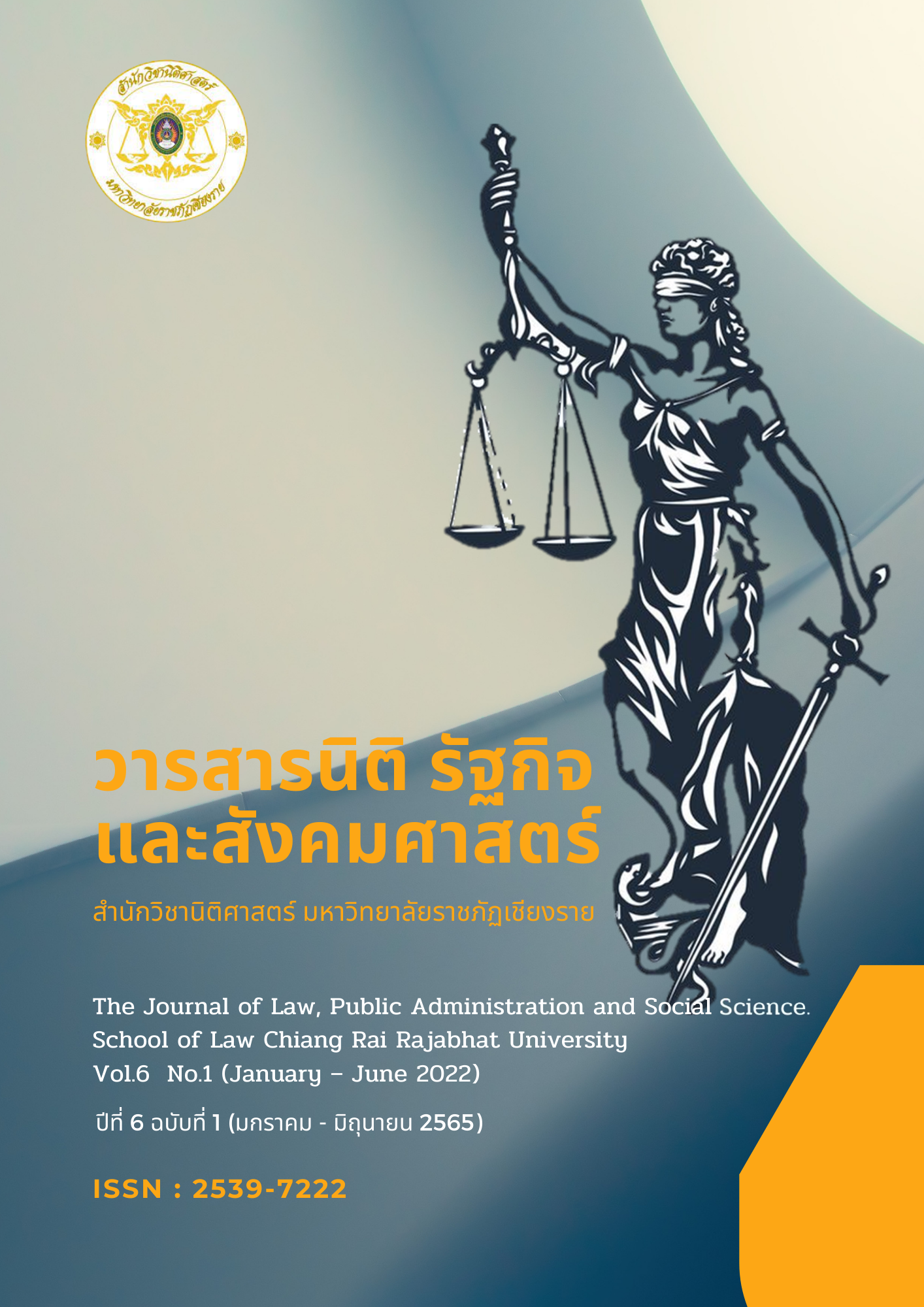Problems on Business Establishment Related to The Definition of “Vat Registration Establishment” of Thailand
Main Article Content
Abstract
Value-added tax (VAT) is the highest tax levied by the state among taxes imposable by law. For this reason, the state must enact specific laws and VAT contains a built-in audit system of the taxation system itself. For example, operators have a duty to collect tax on behalf of the state, issue sales tax invoices, and use credit for tax input. To achieve this, the state designed VAT registration, a legal instrument screening qualifications of entrepreneurs before they enter the VAT system. Many factors are considered, including availability, individual, business type and primarily place of business or establishment as defined under Section 77/1 (20) of the Thailand Revenue Code. This has been in effect since January 1, 1992 without any changes or modifications.
The current social, economic, or business context, including the nature of entrepreneurs, has dramatically changed since the beginning of law enforcement. For example, the business model was originally required to be a storefront. But now it has transformed to online or E-commerce status with no need for a storefront. Government policies advocate a cashless society. Thailand’s 20-Year National Strategy (2017-2036) specifies an estoppel law for traders, for example, e-payment taxes under the Revenue Code Amendment Act No. 48, B.E. 2562 (2019) considers establishments prohibiting condominiums from being used as commercial establishments under VAT law.
The Revenue Department defined rules and conditions for considering establishment of VAT law in items 5 and 6 of the Notification of the Director-General of the Revenue Department on Value Added Tax No. 57, to meet current social economic conditions. There should be a study and comparison to solve the problems of VAT registration establishment in Thailand.
Article Details
References
กรมสรรพากร. ผู้มีสิทธิจดทะเบียนภาษีมูลค่าเพิ่ม. https://vsreg.rd.go.th/jsp/FVATDetail.jsp. สืบค้นเมื่อวันที่ 21 สิงหาคม 2562.
ชินภัทร วิสุทธิแพทย์.“การจัดเก็บภาษีมูลค่าเพิ่มจากธุรกรรมพาณิชย์อิเล็กทรอนิกส์.” วิทยานิพนธมหาบัณฑิต คณะนิติศาสตร์ มหาวิทยาลัยธรรมศาสตร์, 2547.
ชัยสิทธิ์ ตราชูธรรม. คำสอนวิชากฎหมายภาษีอากร. พิมพ์ครั้งที่ 12. กรุงเทพฯ: กรุงสยาม พับลิชชิ่ง, 2561.
เบญจรัตน์ สุวรรณทัต. “การจดทะเบียนภาษีมูลค่าเพิ่มชั่วคราว.” วิทยานิพนธ์มหาบัณฑิต คณะนิติศาสตร์ มหาวิทยาลัยธรรมศาสตร์, 2558.
วิบูลย์ บุณยศิโรตม์. “ภาษีมูลค่าเพิ่มกับภาษีสรรพสามิต.” รัฐสภาสาร, ฉบับที่ 1. ปีที่ 40.
ศิรินันท์ ไทยานันท์. “การเครดิตภาษีซื้อที่เกิดขึ้นก่อนจดทะเบียนภาษีมูลค่าเพิ่ม.” วิทยานิพนธ์มหาบัณฑิต คณะนิติศาสตร์ มหาวิทยาลัยธรรมศาสตร์, 2556.
สุเมธ ศิริคุณโชติ. ภาษีมูลค่าเพิ่ม : หลักการและหลักปฏิบัติในทางระหว่างประเทศ. กรุงเทพฯ: วิญญูชน, 2559.
สุเมธ ศิริคุณโชติ และคณะ. ภาษีอากรตามประมวลรัษฎากร 2562. พิมพ์ครั้งที่ 1. กรุงเทพฯ: เรือนแก้วการพิมพ์, 2562.
สำนักงานสถิติ. “โครงการ: สำมะโนประชากรและเคหะ ปี 2543.” http://statstd.nso.go.th/definition/projectdetail.aspx?periodId=85&, defprodefId =1113. สืบค้นเมื่อวันที่ 13 มกราคม 2564.
วิบูลย์ บุณยศิโรตม์. “ภาษีมูลค่าเพิ่มกับภาษีสรรพสามิต.” รัฐสภาสาร 40, ฉ.1 (ม.ค. 2535): 11.
Skatteverket. “Permanent establishment.” https://skatteverket.se/servicelankar/otherlanguages/inenglish/businessesandemployers/nonswedishbusinesseswithoperationsinsweden/permanentestablishmentinsweden.4.676f4884175c97df4191c82.html. accessed June 15, 2021.


